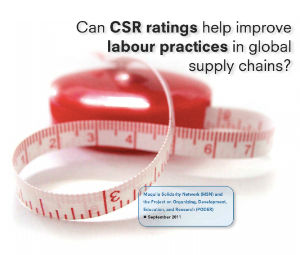1 September 2011
On March 1, 2011, some of the world’s largest apparel and footwear corporations announced the creation of a new Sustainable Apparel Coalition, an initiative to develop an industry-wide index that would measure and evaluate the environmental and social impacts of apparel and footwear products. The initiative promises to draw on the experience of other efforts to rate social and environmental performance to create a “single, open, industry-wide standard of measurement” of everything from water and energy use to greenhouse gas emissions, waste and labour practices. Although few details are available at present, the Coalition intends to release a pilot version of their index for comment later this year.
Arriving at a comprehensive, reliable method of rating the social and environmental impacts of a company or product would be a promising development for companies, consumers and investors, especially if that rating system has buy-in from a significant number of influential companies. Rating systems are potentially powerful tools because they simplify large quantities of complex data into an easy to digest format, assigning a numerical score or letter grade to represent the company’s standing against a set of social or environmental indicators. They can provide users, such as consumers, investors, media and labour or environmental organizations, with a simple method of comparing companies and separating the “leaders” from the “laggards.”
Yet given the vast and rapidly changing nature of global supply chains that produce apparel, footwear and other consumer
goods, rating a company or a product on its environmental impacts is no easy matter. Rating a company’s or product’s social impacts – and more specifically, whether the company is respecting the rights of the workers who make the product – is even more complex.
A publication of Project on Organizing, Development, Education, and Research (PODEr) and the Maquila Solidarity Network (MSN).

